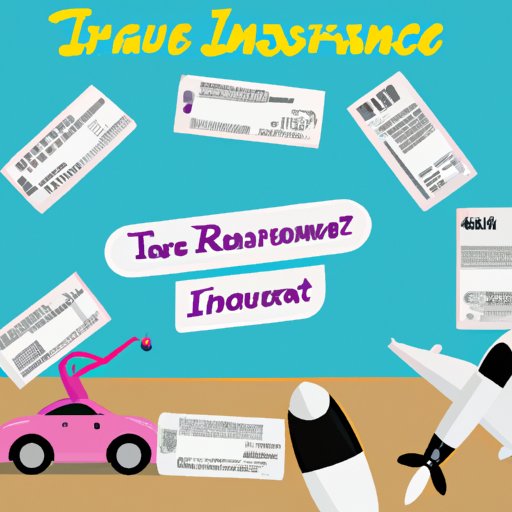Introduction
Travel insurance is a type of insurance that covers unexpected losses incurred during a trip, such as medical emergencies, trip cancellations or interruptions, baggage loss, and personal liability. While it can be tempting to forego purchasing travel insurance, doing so can leave you at risk of costly losses should something go wrong on your trip. This article will explore the benefits, costs, and risks associated with purchasing travel insurance, as well as provide guidance on when it is necessary.
Comparing the Benefits of Different Types of Travel Insurance
Travel insurance policies typically offer coverage in the following areas: medical coverage, trip cancellation/interruption coverage, baggage and personal effects coverage, and personal liability coverage.
Medical Coverage
Medical coverage offers protection from the high cost of medical treatment while traveling. According to a study conducted by the U.S. Travel Insurance Association, in 2017, the average cost of a medical emergency overseas was $14,500. Medical coverage can also provide reimbursement for medical evacuations, which have been known to cost up to $100,000.
Trip Cancellation/Interruption Coverage
Trip cancellation/interruption coverage reimburses travelers for expenses paid prior to the trip if they are forced to cancel or interrupt their travels due to unforeseen circumstances. Common covered reasons include illness, injury, job loss, and natural disasters.
Baggage and Personal Effects Coverage
Baggage and personal effects coverage reimburses travelers for lost, stolen, or damaged items while traveling. The amount of coverage and specific items covered vary depending on the policy.
Personal Liability Coverage
Personal liability coverage protects travelers from the financial costs associated with lawsuits if they are found liable for any injuries or damage caused to another person or property.
Exploring the Costs of Travel Insurance
The cost of travel insurance varies depending on the type of policy purchased and the length of the trip. Generally, premiums are calculated based on the cost of the trip, age of the traveler, and length of the trip. The premium is then multiplied by a factor determined by the insurer to determine the final cost.
Travel insurance policies also typically have a deductible, which is the amount the insured must pay out of pocket before the insurer will pay a claim. Deductibles are usually a percentage of the total cost of the trip, ranging from 2% to 10%.

Understanding When Travel Insurance is Necessary
While purchasing travel insurance is always recommended, there are certain situations where it is especially important.
International Travel
If you are traveling outside of your home country, having travel insurance is essential. Most health insurance plans will not cover medical costs incurred abroad, leaving you vulnerable to potentially astronomical bills.
High-Risk Activities
If you plan to engage in activities deemed to be “high-risk”, such as skiing, scuba diving, or bungee jumping, having travel insurance is highly recommended. Many insurers will provide additional coverage for these activities, but you will need to purchase a policy that specifically covers them.
Length of Trip
If you are planning a longer trip (typically defined as more than 30 days), it is important to purchase a policy that covers the entire duration of the trip. Standard policies typically only cover up to 30 days, so you may need to purchase additional coverage if your trip is longer.
Examining Common Exclusions and Limitations
It is important to understand that travel insurance policies do have exclusions and limitations. Common exclusions include pre-existing medical conditions, acts of war and terrorism, and natural disasters.
Pre-Existing Medical Conditions
Most travel insurance policies exclude coverage for any medical condition that existed prior to the purchase of the policy. If you have a pre-existing medical condition, you may need to purchase additional coverage or a separate policy in order to be protected.
Acts of War and Terrorism
Most policies also exclude coverage for acts of war and terrorism. If you are traveling to a country that is considered to be at risk of war or terrorism, it is important to check with your insurer to see if they provide coverage.
Natural Disasters
Travel insurance policies typically exclude coverage for natural disasters, such as earthquakes and floods. If you are traveling to a region prone to natural disasters, it is important to check with your insurer to ensure that you are covered.

Evaluating Your Personal Risk Tolerance
In addition to understanding the benefits, costs, and exclusions of travel insurance, it is important to evaluate your own risk tolerance. To do this, you should assess your risk by considering potential losses should something go wrong on your trip. Then, calculate the cost of those potential losses and compare it to the cost of purchasing travel insurance. This will help you determine if the added peace of mind of having travel insurance is worth the cost.

Reviewing Consumer Reviews and Ratings
Once you have decided to purchase travel insurance, it is important to research the different providers to make sure you are getting the best deal. One way to do this is to read online reviews from other consumers who have used the company’s services. Additionally, you can look up ratings from independent sources such as the Better Business Bureau and J.D. Power & Associates.
Conclusion
Travel insurance is a valuable tool for protecting yourself from unexpected losses while traveling. By understanding the benefits, costs, and risks associated with travel insurance, as well as common exclusions and limitations, you can make an informed decision about when to purchase travel insurance. Additionally, evaluating your own risk tolerance and researching consumer reviews and ratings can help you find the best policy for your needs.
(Note: Is this article not meeting your expectations? Do you have knowledge or insights to share? Unlock new opportunities and expand your reach by joining our authors team. Click Registration to join us and share your expertise with our readers.)
